Typescript account of the Battle of Messines by Robert Cuthbert Grieve, [1917] - Part 2
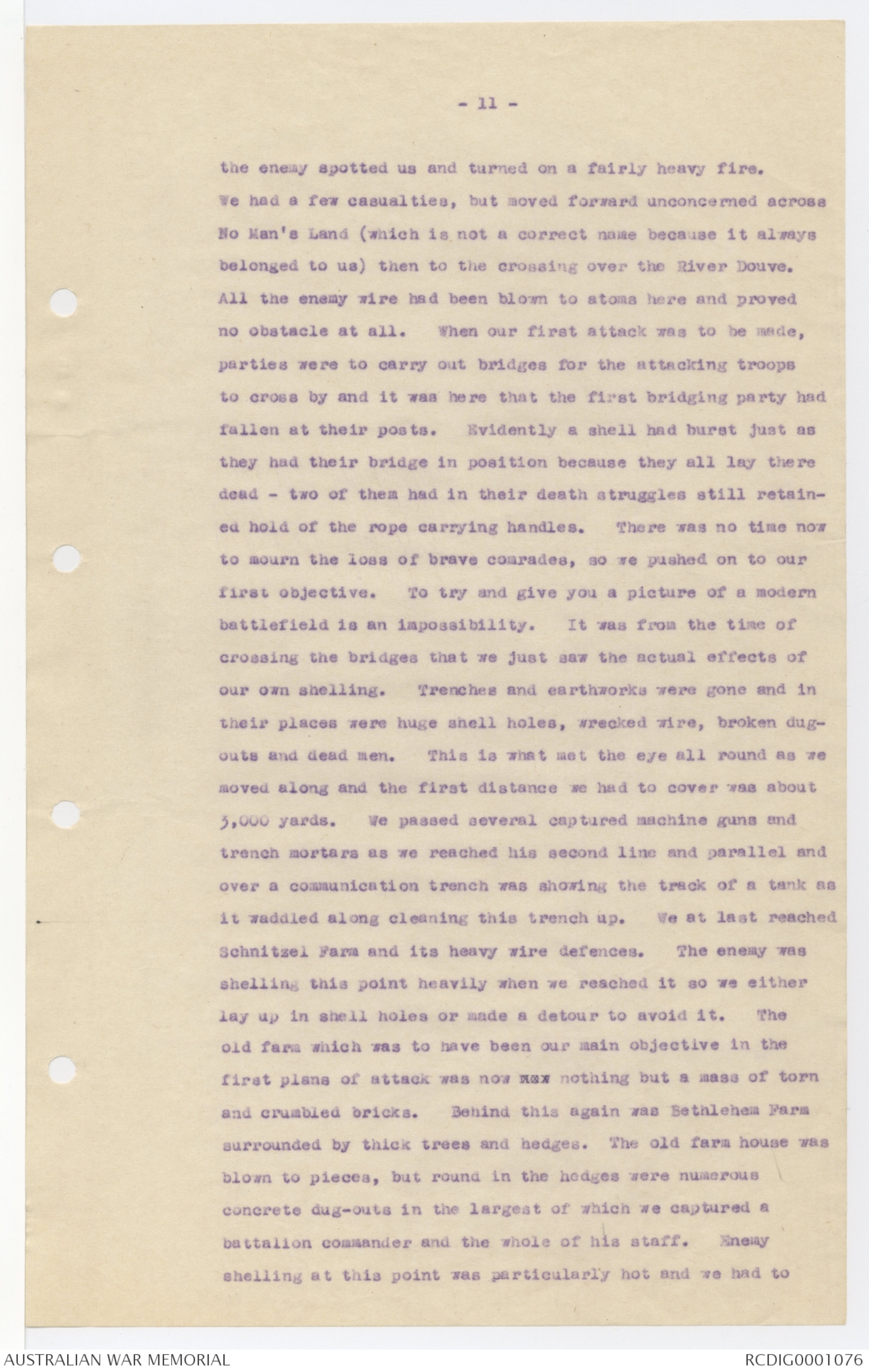
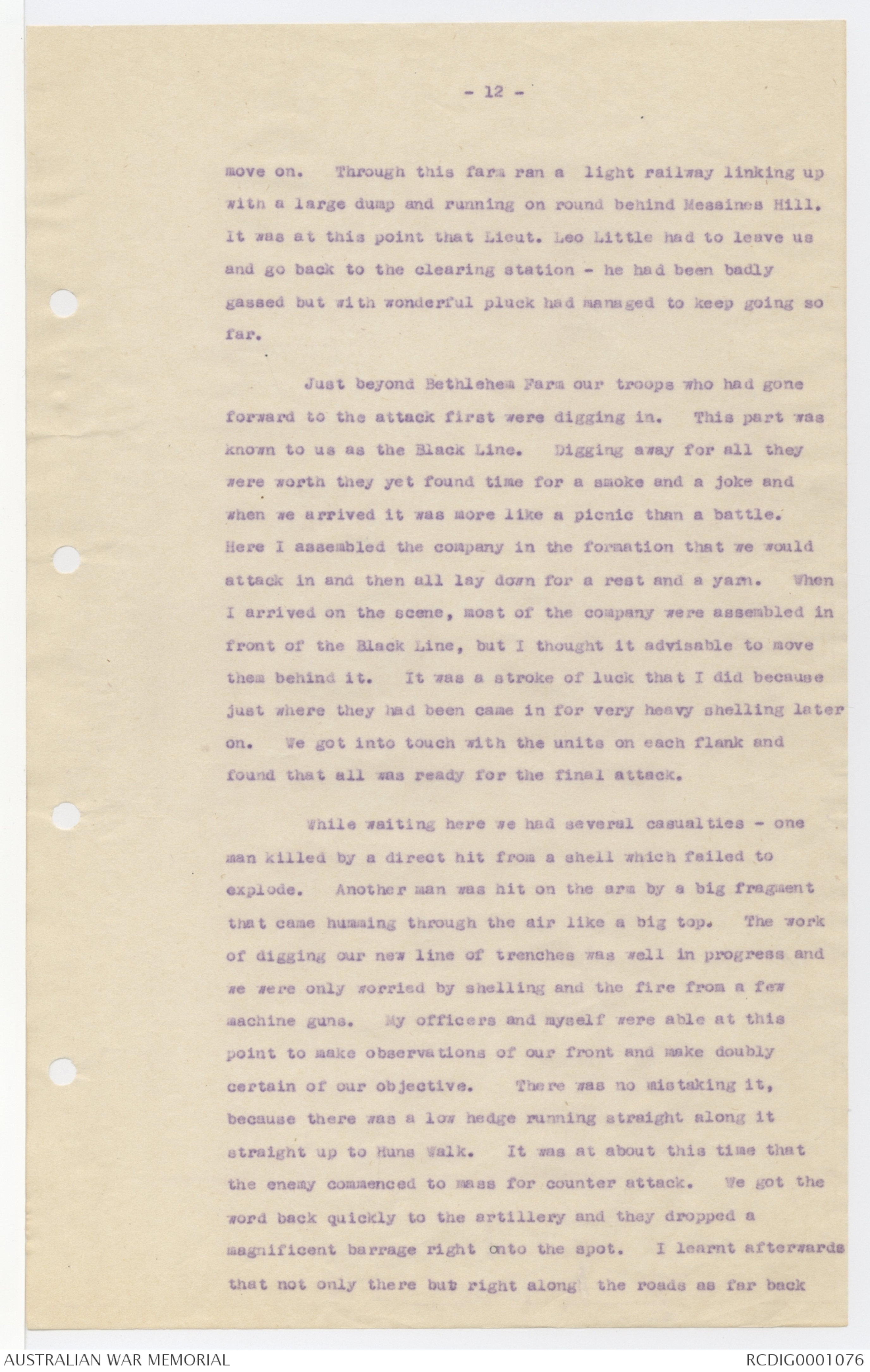
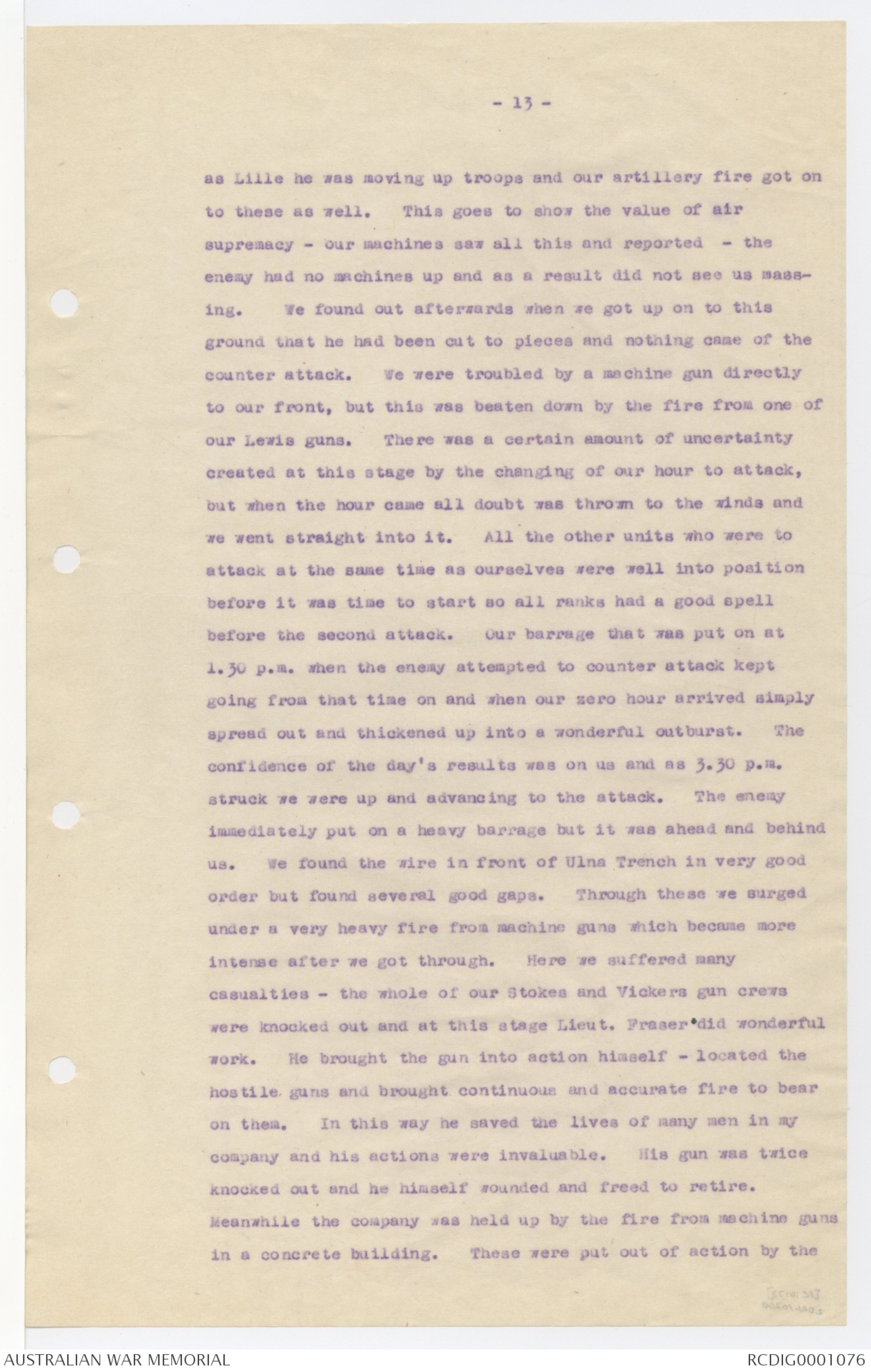
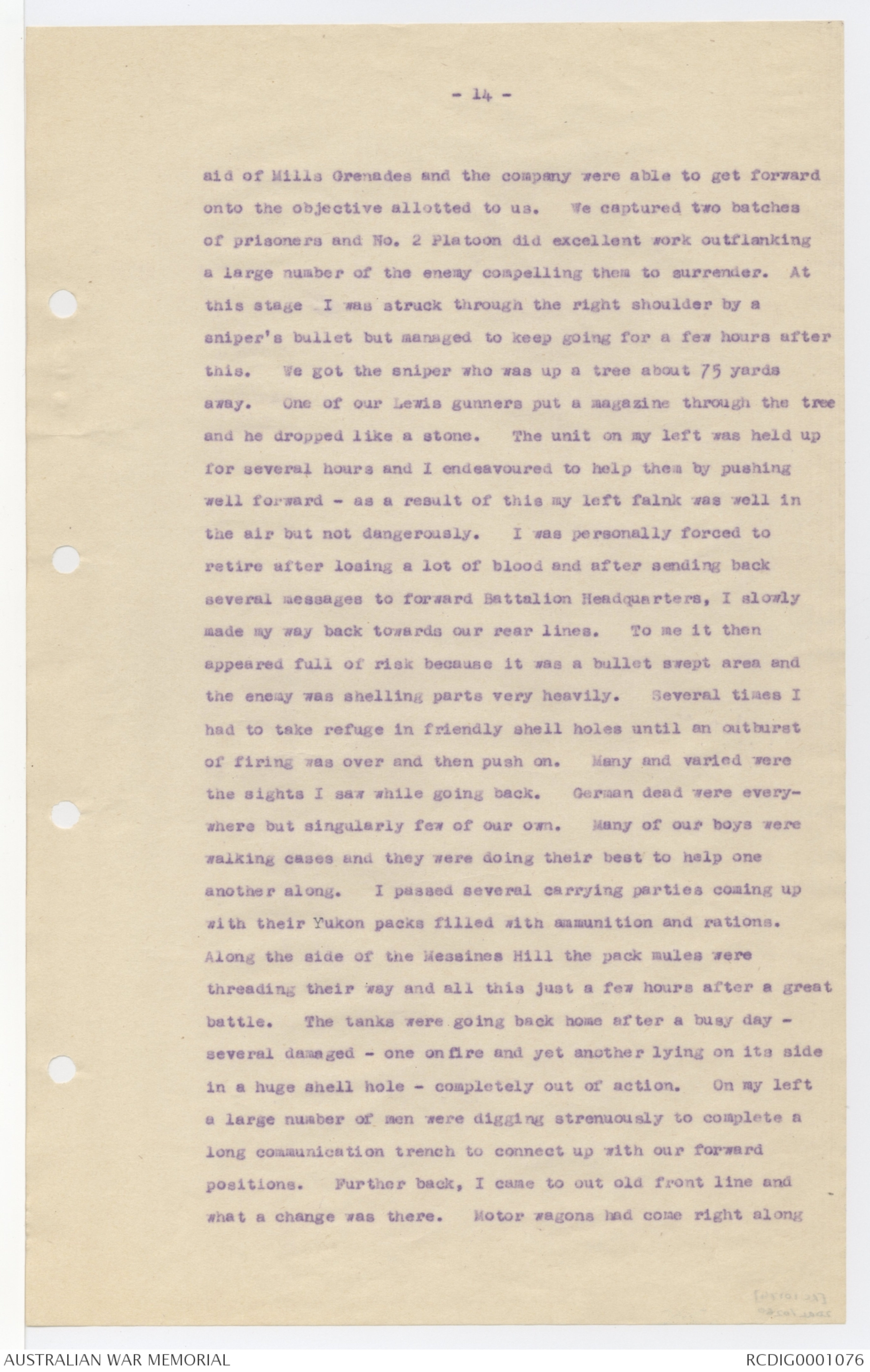
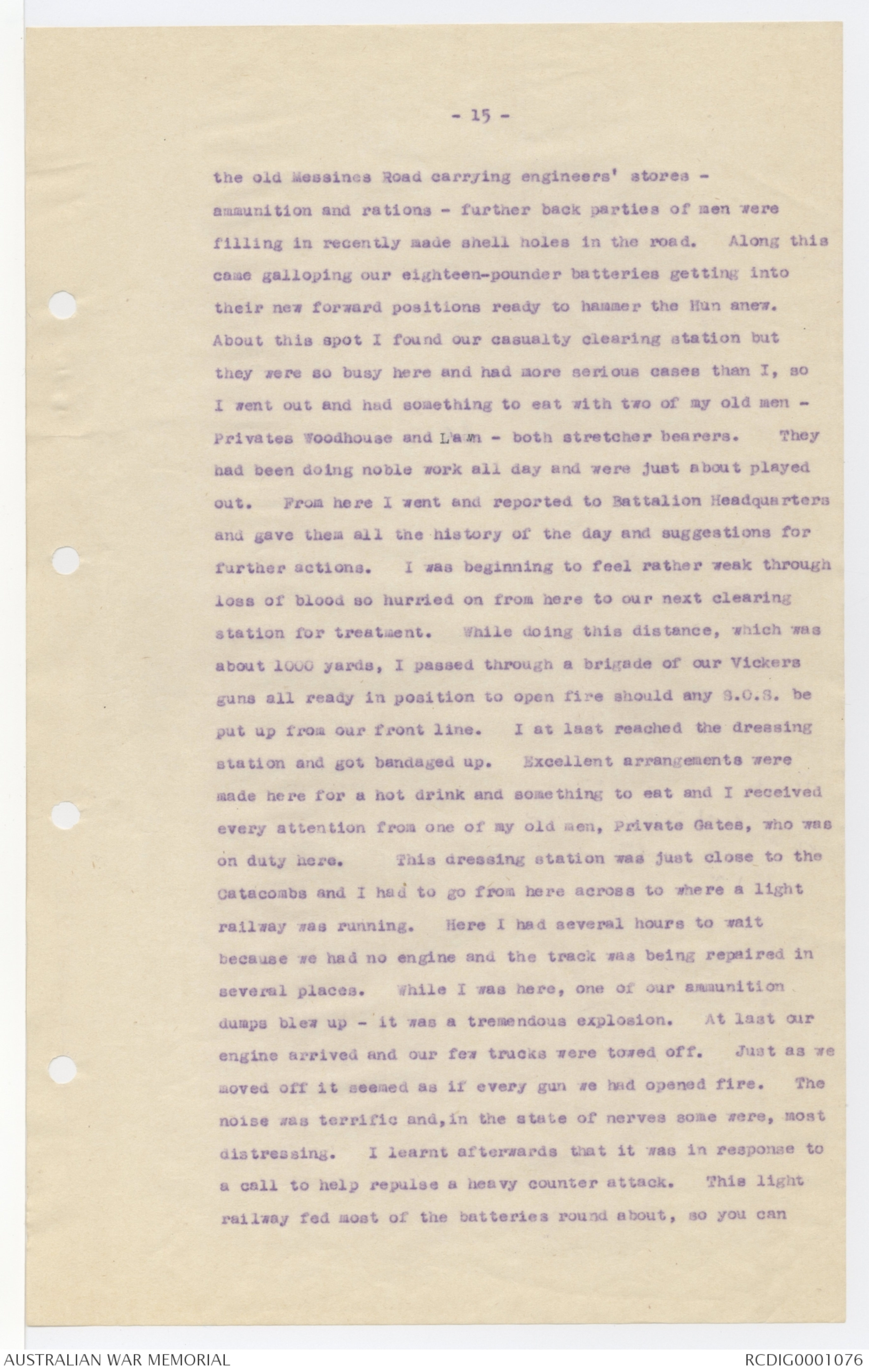
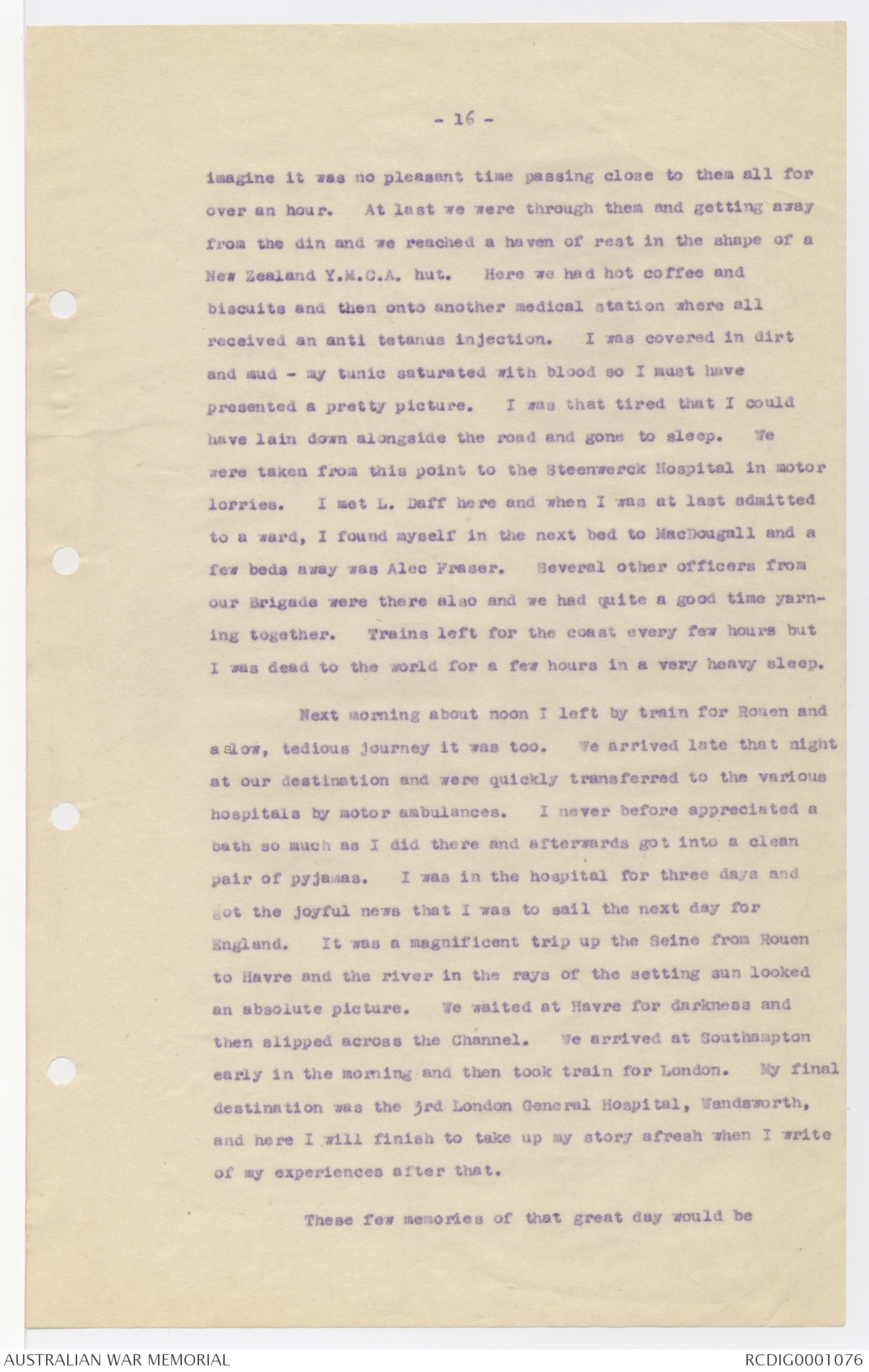
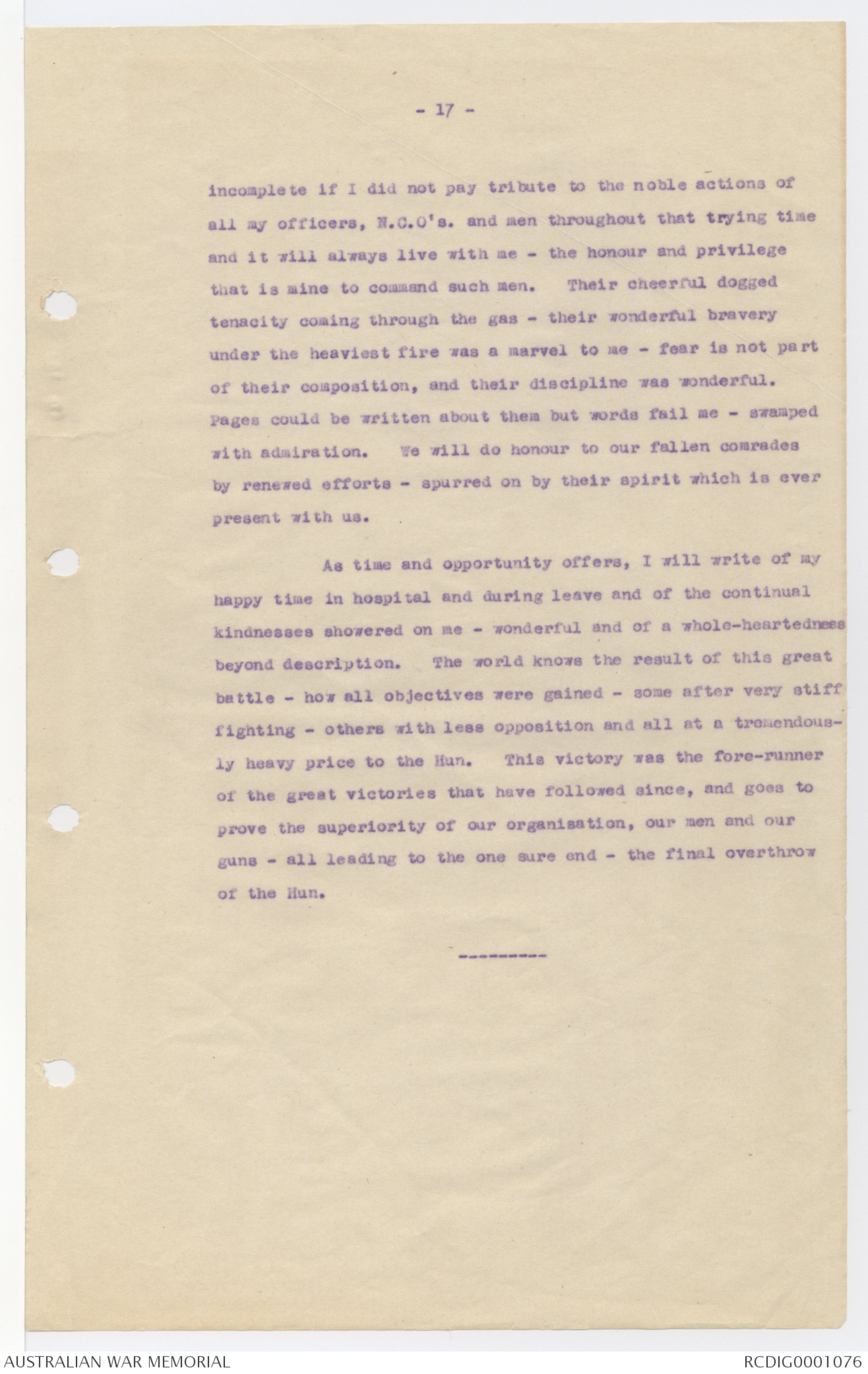
- 11 -
the enemy spotted us and turned on a fairly heavy fire.
We had a few casualties, but moved forward unconcerned across
No Man's Land (which is not a correct name because it always
belonged to us) then to the crossing over the River Douve.
All the enemy wire had been blown to atoms here and proved
no obstacle at all. When our first attack was to be made,
parties were to carry out bridges for the attacking troops
to cross by and it was here that the first bridging party had
fallen at their posts. Evidently a shell had burst just as
they had their bridge in position because they all lay there
dead - two of them had in their death struggles still retained
hold of the rope carrying handles. There was no time now
to mourn the loss of brave comrades, so we pushed on to our
first objective. To try and give you a picture of a modern
battlefield is an impossibility. It was from the time of
crossing the bridges that we just saw the actual effects of
our own shelling. Trenches and earthworks were gone and in
their places were huge shell holes, wrecked wire, broken dugouts
and dead men. This is what met the eye all round as we
moved along and the first distance we had to cover was about
3,000 yards. We passed several captured machine guns and
trench mortars as we reached his second line and parallel and
over a communication trench was showing the track of a tank as
it waddled along cleaning this trench up. We at last reached
Schnitzel Farm and its heavy wire defences. The enemy was
shelling this point heavily when we reached it so we either
lay up in shell holes or made a detour to avoid it. The
old farm which was to have been our main objective in the
first plans of attack was now nas nothing but a mass of torn
and crumbled bricks. Behind this again was Bethlehem Farm
surrounded by thick trees and hedges. The old farm house was
blown to pieces, but round in the hedges were numerous
concrete dug-outs in the largest of which we captured a
battalion commander and the whole of his staff. Enemy
shelling at this point was particularly hot and we had to
- 12 -
move on. Through this farm ran a light railway linking up
with a large dump and running on round behind Messines Hill.
It was at this point that Lieut. Leo Little had to leave us
and go back to the clearing station - he had been badly
gassed but with wonderful pluck had managed to keep going so
far.
Just beyond Bethlehem Farm our troops who had gone
forward to the attack first were digging in. This part was
known to us as the Black Line. Digging away for all they
were worth they yet found time for a smoke and a joke and
when we arrived it was more like a picnic than a battle.
Here I assembled the company in the formation that we would
attack in and then all lay down for a rest and a yarn. When
I arrived on the scene, most of the company were assembled in
front of the Black Line, but I thought it advisable to move
them behind it. It was a stroke of luck that I did because
just where they had been came in for very heavy shelling later
on. We got into touch with the units on each flank and
found that all was ready for the final attack.
While waiting here we had several casualties - one
man killed by a direct hit from a shell which failed to
explode. Another man was hit on the arm by a big fragment
that came humming through the air like a big top. The work
of digging our new line of trenches was well in progress and
we were only worried by shelling and the fire from a few
machine guns. My officers and myself were able at this
point to make observations of our front and make doubly
certain of our objective. There was no mistaking it,
because there was a low hedge running straight along it
straight up to Huns Walk. It was at about this time that
the enemy commenced to mass for counter attack. We got the
word back quickly to the artillery and they dropped a
magnificent barrage right onto the spot. I learnt afterwards
that not only there but right along the roads as far back
- 13 -
as Lille he was moving up troops and our artillery fire got on
to these as well. This goes to show the value of air
supremacy - our machines saw all this and reported - the
enemy had no machines up and as a result did not see us massing.
We found out afterwards when we got up on to this
ground that he had been cut to pieces and nothing came of the
counter attack. We were troubled by a machine gun directly
to our front, but this was beaten down by the fire from one of
our Lewis guns. There was a certain amount of uncertainty
created at this stage by the changing of our hour to attack,
but when the hour came all doubt was thrown to the winds and
we went straight into it. All the other units who were to
attack at the same time as ourselves were well into position
before it was time to start so all ranks had a good spell
before the second attack. Our barrage that was put on at
1.30 p.m. when the enemy attempted to counter attack kept
going from that time on and when our zero hour arrived simply
spread out and thickened up into a wonderful outburst. The
confidence of the day's results was on us and as 3.30 p.m.
struck we were up and advancing to the attack. The enemy
immediately put on a heavy barrage but it was ahead and behind
us. We found the wire in front of Ulna Trench in very good
order but found several good gaps. Through these we surged
under a very heavy fire from machine guns which became more
intense after we got through. Here we suffered many
casualties - the whole of our Stokes and Vickers gun crews
were knocked out and at this stage Lieut. Fraser did wonderful
work. He brought the gun into action himself - located the
hostile guns and brought continuous and accurate fire to bear
on them. In this way he saved the lives of many men in my
company and his actions were invaluable. His gun was twice
knocked out and he himself wounded and freed to retire.
Meanwhile the company was held up by the fire from machine guns
in a concrete building. These were put out of action by the
- 14-.
aid of Mills Grenades and the company were able to get forward
onto the objective allotted to us. We captured two batches
of prisoners and No. 2 Platoon did excellent work outflanking
a large number of the enemy compelling them to surrender. At
this stage I was struck through the right shoulder by a
sniper's bullet but managed to keep going for a few hours after
this. We got the sniper who was up a tree about 75 yards
away. One of our Lewis gunners put a magazine through the tree
and he dropped like a stone. The unit on my left was held up
for several hours and I endeavoured to help them by pushing
well forward - as a result of this my left flank was well in
the air but not dangerously. I was personally forced to
retire after losing a lot of blood and after sending back
several messages to forward Battalion Headquarters, I slowly
made my way back towards our rear lines. To me it then
appeared full of risk because it was a bullet swept area and
the enemy was shelling parts very heavily. Several times I
had to take refuge in friendly shell holes until an outburst
of firing was over and then push on. Many and varied were
the sights I saw while going back. German dead were everywhere
but singularly few of our own. Many of our boys were
walking cases and they were doing their best to help one
another along. I passed several carrying parties coming up
with their Yukon packs filled with ammunition and rations.
Along the side of the Messines Hill the pack mules were
threading their way and all this just a few hours after a great
battle. The tanks were going back home after a busy day
several damaged - one on fire and yet another lying on its side
in a huge shell hole - completely out of action. On my left
a large number of men were digging strenuously to complete a
long communication trench to connect up with our forward
positions. Further back, I came to our old front line and
what a change was there. Motor wagons had come right along
- 15 -
the old Messines Road carrying engineers' stores -
ammunition and rations - further back parties of men were
filling in recently made shell holes in the road. Along this
came galloping our eighteen-pounder batteries getting into
their new forward positions ready to hammer the Hun anew.
About this spot I found our casualty clearing station but
they were so busy here and had more serious cases than I, so
I went out and had something to eat with two of my old men -
Privates Woodhouse and Lawn - both stretcher bearers. They
had been doing noble work all day and were just about played
out. From here I went and reported to Battalion Headquarters
and gave them all the history of the day and suggestions for
further actions. I was beginning to feel rather weak through
loss of blood so hurried on from here to our next clearing
station for treatment. While doing this distance, which was
about 1000 yards, I passed through a brigade of our Vickers
guns all ready in position to open fire should any S.O.S. be
put up from our front line. I at last reached the dressing
station and got bandaged up. Excellent arrangements were
made here for a hot drink and something to eat and I received
every attention from one of my old men, Private Gates, who was
on duty here. This dressing station was just close to the
Catacombs and I had to go from here across to where a light
railway was running. Here I had several hours to wait
because we had no engine and the track was being repaired in
several places. While I was here, one of our ammunition
dumps blew up - it was a tremendous explosion. At last our
engine arrived and our few trucks were towed off. Just as we
moved off it seemed as if every gun we had opened fire. The
noise was terrific and, in the state of nerves some were, most
distressing. I learnt afterwards that it was in response to
a call to help repulse a heavy counter attack. This light
railway fed most of the batteries round about, so you can
- 16 -
imagine it was no pleasant time passing close to them all for
over an hour. At last we were through them and getting away
from the din and we reached a haven of rest in the shape of a
New Zealand Y.M.C.A. hut. Here we had hot coffee and
biscuits and then onto another medical station where all
received an anti tetanus injection. I was covered in dirt
and mud - my tunic saturated with blood so I must have
presented a pretty picture. I was that tired that I could
have lain down alongside the road and gone to sleep. We
were taken from this point to the Steenwerck Hospital in motor
lorries. I met L. Daff here and when I was at last admitted
to a ward, I found myself in the next bed to MacDougall and a
few beds away was Alec Fraser. Several other officers from
our Brigade were there also and we had quite a good time yarning
together. Trains left for the coast every few hours but
I was dead to the world for a few hours in a very heavy sleep.
Next morning about noon I left by train for Rouen and
a slow, tedious journey it was too. We arrived late that night
at our destination and were quickly transferred to the various
hospitals by motor ambulances. I never before appreciated a
bath so much as I did there and afterwards got into a clean
pair of pyjamas. I was in the hospital for three days and
got the joyful news that I was to sail the next day for
England. It was a magnificent trip up the Seine from Rouen
to Havre and the river in the rays of the setting sun looked
an absolute picture. We waited at Havre for darkness and
then slipped across the Channel. We arrived at Southampton
early in the morning and then took train for London. My final
destination was the 3rd London General Hospital, Wandsworth,
and here I will finish to take up my story afresh when I write
of my experiences after that.
These few memories of that great day would be
- 17 -
incomplete if I did not pay tribute to the noble actions of
all my officers, N.C.O's. and men throughout that trying time
and it will always live with me - the honour and privilege
that is mine to command such men. Their cheerful dogged
tenacity coming through the gas - their wonderful bravery
under the heaviest fire was a marvel to me - fear is not part
of their composition, and their discipline was wonderful.
Pages could be written about them but words fail me - swamped
with admiration. We will do honour to our fallen comrades
by renewed efforts - spurred on by their spirit which is ever
present with us.
As time and opportunity offers, I will write of my
happy time in hospital and during leave and of the continual
kindnesses showered on me - wonderful and of a whole-heartedness
beyond description. The world knows the result of this great
battle - how all objectives were gained - some after very stiff
fighting - others with less opposition and all at a tremendously
heavy price to the Hun. This victory was the fore-runner
of the great victories that have followed since, and goes to
prove the superiority of our organisation, our men and our
guns - all leading to the one sure end - the final overthrow
of the Hun.
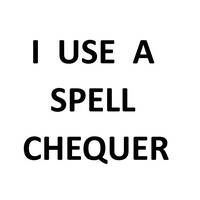 Not Yet Replaced By AI
Not Yet Replaced By AIThis transcription item is now locked to you for editing. To release the lock either Save your changes or Cancel.
This lock will be automatically released after 60 minutes of inactivity.